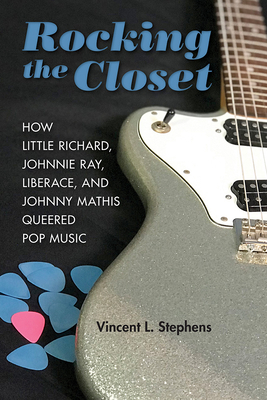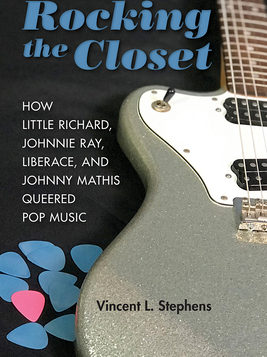 Rocking the Closet: How Little Richard, Johnnie Ray,
Rocking the Closet: How Little Richard, Johnnie Ray,
Liberace, and Johnny Mathis Queered Pop Music
by Vincent L. Stephens
University of Illinois Press
248 pages, $27.95
LAST SEPTEMBER, The New Yorker reviewed a book on reading in which the reviewer noted that there’s no war between the Internet and books; the Internet is now part of the way we read. We do it because we can look things up on Google or YouTube as we go along. Rocking the Closet, a new book by Vincent L. Stephens about four legendary singers—Little Richard, Liberace, Johnny Mathis, and Johnnie Ray—is a case in point.
Halfway through, I decided to look up Johnnie Ray, for example, on YouTube. Johnnie Ray is thought to be the first white pop star to sing like a black one. He was also “openly deaf” (after a childhood accident left him with partial hearing in his left ear), “effeminate, bisexual,” and often in trouble with the law for soliciting sex with men, though the most shocking thing about him might be that he had an affair with Dorothy Kilgallen, the thin-lipped, bird-like gossip columnist who became a panelist on What’s My Line? Learning about Ray was interesting enough, but not until I saw him sing his big hit “Cry” did I get exactly what it was that Stephens had described in prose. The moment Ray began with “If your sweetheart sends a letter,” I understood: This is the man who did what Elvis did, before Elvis did it.
Traveling back through the history of pop music with what Stephens calls “the Queer Quartet” is both a reminder and a discovery of musical figures that you may or may not have heard of, depending upon your age. Even people who’ve listened to the velvet voices of Johnny Hartman and Billy Eckstine may not have heard of Little Jimmy Scott or Gladys Bentley, a “large, African American woman whose dapper white tuxedo and raunchy blues performances defied a slew of gender, racial, and show-business conventions.” At her career peak from 1929 to 1932, Bentley “performed regularly in front of a chorus of male ‘pansies’ and married a white woman in a civil ceremony in New Jersey,” and was one of the reasons people went up to Harlem in the early 1930s.
Andrew Holleran is the author of the novels Dancer from the Dance, Nights in Aruba, The Beauty of Men, and Grief.







